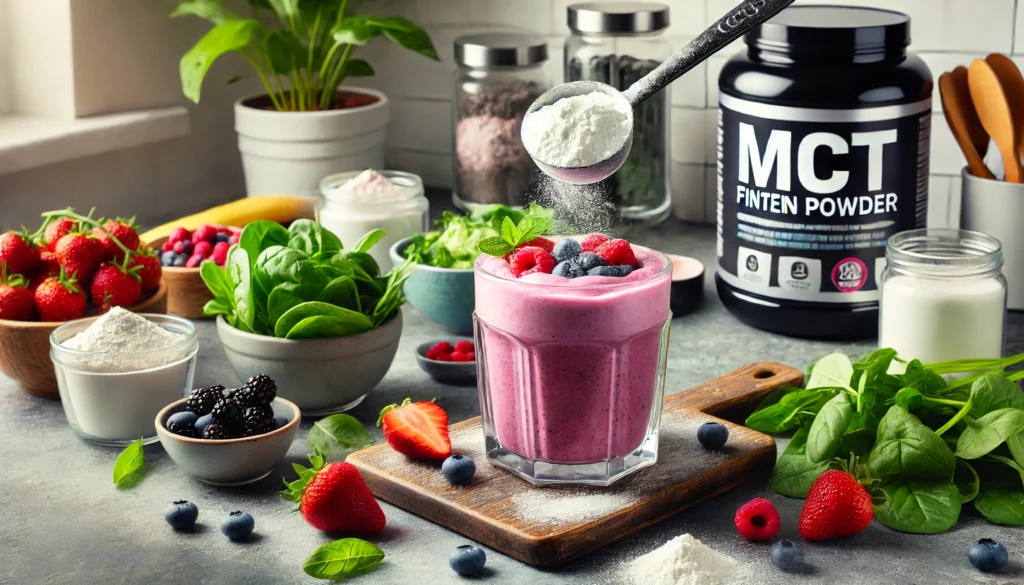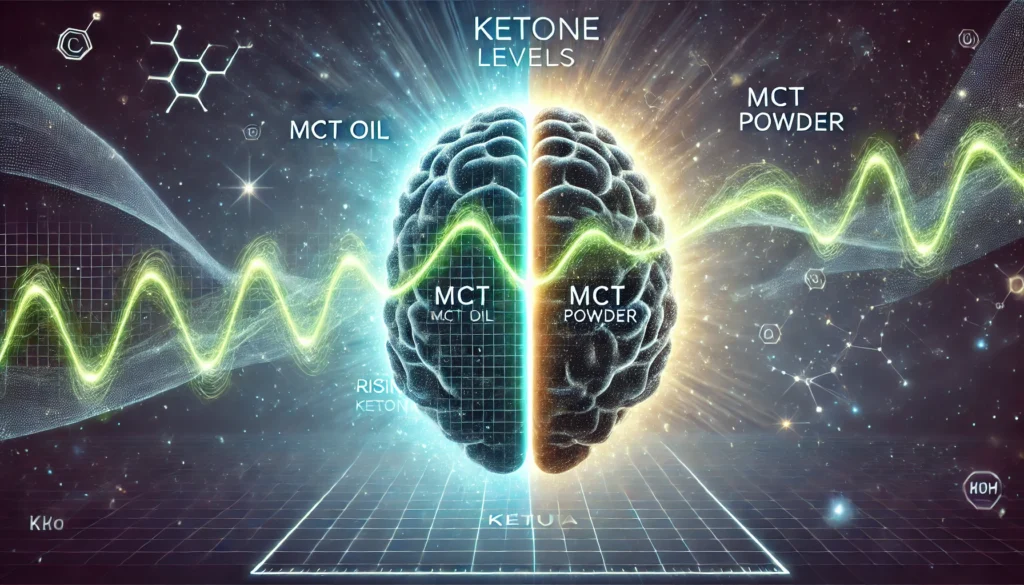Introduction
In the rapidly evolving landscape of nutritional supplements and metabolic biohacking, medium-chain triglycerides (MCTs) have emerged as a powerhouse for brain fuel, metabolic flexibility, and gut health. Whether you’re a ketogenic dieter, an athlete seeking optimized energy, or someone exploring natural cognitive enhancers, MCTs are almost unavoidable in the conversation. But in recent years, a new dilemma has surfaced: MCT powder vs oil—which format delivers the best results?
You may also like: MCT Oil for Dementia and Brain Health: Exploring Its Role in Memory, Function, and Alzheimer’s Support
Both forms promise the same key benefit: rapid conversion into ketones that bypass typical fat metabolism, offering immediate energy, especially for the brain. But the mode of delivery—liquid oil versus encapsulated or spray-dried powder—may significantly affect absorption rates, digestive tolerance, portability, and even how the body responds biochemically. The mct oil vs mct powder debate is more than a matter of taste or convenience; it’s a deeper discussion rooted in metabolic science, gastrointestinal dynamics, and lifestyle integration.
In this article, we’ll explore everything you need to know to make an informed, evidence-based decision between mct oil powder vs oil. We’ll break down the biochemical mechanisms, compare clinical outcomes, review real-world use cases, and provide expert insight on how to choose the right form of MCT for your unique goals—whether that’s brain fog elimination, fat-burning efficiency, or digestive comfort.
As with any supplement, context is king. While both versions can elevate ketone levels and improve mental clarity, individual results may vary based on gut health, metabolic profile, and co-consumed nutrients. Let’s dive into the science, the usage nuances, and the real-world performance differences between these two MCT formats.
What Are MCTs and Why Are They So Popular?
Medium-chain triglycerides are a form of dietary fat made up of medium-length chains of carbon atoms. Unlike long-chain triglycerides (LCTs), which are common in most fats and oils, MCTs are digested quickly and travel directly to the liver, where they’re rapidly converted into ketones—an alternative fuel source to glucose.
This fast-track metabolism has made MCTs especially popular among people following low-carb or ketogenic diets, as well as athletes, high performers, and individuals managing neurological conditions. Ketones from MCTs have been shown to support cognitive function, suppress appetite, increase energy levels, and possibly enhance fat burning.
The most well-known MCTs include caprylic acid (C8), capric acid (C10), and lauric acid (C12), with C8 being the most efficient at producing ketones. Whether delivered via liquid oil or powder, MCTs can enter the bloodstream quickly and begin offering benefits within minutes. But the delivery format could impact how well they’re tolerated and absorbed, which brings us to the comparison of mct powder vs oil.

MCT Oil: The Original, Fast-Acting Ketone Booster
MCT oil is the unprocessed, liquid form of medium-chain triglycerides. Typically extracted from coconut oil or palm kernel oil, MCT oil has been the go-to for ketogenic enthusiasts, nootropic users, and functional medicine practitioners for decades.
The key advantage of MCT oil is its purity and potency. High-quality versions contain up to 100% caprylic and capric acid, ensuring fast conversion into ketones. This makes MCT oil ideal for immediate cognitive enhancement, pre-workout energy, or fasting support. In fact, studies have shown that taking MCT oil before a mentally demanding task or endurance event can significantly improve performance and stamina.
However, despite its speed and efficacy, MCT oil isn’t without its challenges. Many users report gastrointestinal distress, especially when taken on an empty stomach or in higher doses. Liquid oil can be messy, hard to travel with, and requires mixing into drinks or foods—making it less convenient for busy lifestyles.
The debate of mct oil vs mct powder often starts here: while oil is fast and effective, its digestive impact and practical limitations have opened the door for a new contender—powder.

MCT Powder: A Modern Upgrade or Marketing Gimmick?
MCT powder is created through a process called spray-drying, in which liquid MCT oil is bound to a carrier such as acacia fiber, tapioca starch, or gum arabic. This process turns the oil into a fine, dry powder that can be easily mixed into beverages, baked into foods, or encapsulated for pill-form delivery.
The biggest selling point of MCT powder is its digestive friendliness. By combining MCTs with prebiotic carriers, the powder format can slow down absorption just enough to reduce stomach upset and diarrhea—a common complaint with oil. This makes it ideal for beginners, people with sensitive digestive systems, or those who plan to consume MCTs multiple times a day.
From a formulation standpoint, mct oil powder vs oil isn’t simply a matter of consistency—it’s about how the body handles the fat and how efficiently the ketones are produced. Some studies suggest that the ketone boost from MCT powder may be slightly less rapid than oil, but more sustained over time. The trade-off may be worthwhile for those prioritizing comfort and consistency over peak-speed performance.
MCT powder is also more portable, easier to measure, and often available in flavored formats, which makes it popular among lifestyle users who want to include MCTs in coffee, smoothies, or baking recipes.

Comparing Ketone Production: MCT Powder vs Oil
When evaluating mct powder vs oil, one of the most important questions is: which one raises ketones more effectively?
Research indicates that both formats are effective at increasing blood ketone levels, especially when they contain a high percentage of C8. However, MCT oil tends to spike ketone levels faster, particularly within the first hour after consumption. This makes it ideal for acute performance needs like mental clarity before meetings, workouts, or cognitively demanding tasks.
MCT powder, on the other hand, appears to produce a slower, steadier ketone curve. While the initial peak may be lower than that of oil, the elevated ketone state can last longer, especially when consumed alongside other foods. This sustained release can be beneficial for those using MCTs for extended energy, appetite suppression, or stable mood throughout the day.
The mct oil vs mct powder decision here comes down to personal needs: if you want fast-acting mental energy, oil may be your best bet. If you’re aiming for long-term support with fewer digestive issues, powder could be the smarter choice.
Digestive Tolerance and Gut Health Considerations
One of the most common complaints with MCT oil is gastrointestinal discomfort. Because MCT oil is rapidly absorbed and metabolized, it can overwhelm the digestive tract—especially in people who are new to using it or who take it in large amounts.
Symptoms like cramping, loose stools, and nausea are not uncommon, which has led many users to explore powder-based alternatives. MCT powder tends to be much gentler on the stomach, particularly when it uses a prebiotic fiber like acacia as the carrier. This can support a healthier gut microbiome, reduce bloating, and help maintain regularity.
In fact, for individuals with IBS, SIBO, or other gut sensitivities, the mct oil powder vs oil debate often ends in favor of powder. The addition of fiber not only improves tolerability but may also offer added metabolic benefits by slowing glucose spikes and improving nutrient absorption.
However, not all MCT powders are created equal. Some use low-quality carriers or include unnecessary additives that may cause their own digestive issues. Reading ingredient labels and choosing clean formulations is crucial.
Bioavailability and Nutrient Absorption
Another critical factor in the mct powder vs oil discussion is bioavailability—how effectively the body absorbs and utilizes the nutrients.
MCT oil, being a pure fat, is highly bioavailable and enters the liver almost immediately upon ingestion. This rapid metabolism is ideal for quick ketone generation, but it also means that the effects are relatively short-lived unless paired with a high-fat diet.
MCT powder may offer slightly reduced initial bioavailability due to the binding agents used in production. However, when paired with meals or used in recipes, the powder may enhance the absorption of fat-soluble vitamins like A, D, E, and K. Some research suggests that powdered MCTs may also stabilize blood sugar levels more effectively due to the presence of fiber.
Ultimately, the bioavailability differences are minimal for most users. Both formats deliver usable ketones and improve energy levels, focus, and fat metabolism—so long as they’re taken in appropriate doses and alongside a nutrient-rich diet.

Use Cases and Lifestyle Compatibility
When it comes to real-world application, the mct oil vs mct powder decision often comes down to how you plan to use it.
MCT oil is best for those who need fast results: morning focus, pre-workout energy, or support during intermittent fasting. It’s easy to mix into black coffee (aka “bulletproof coffee”) or take straight by the spoonful. However, it requires careful dosing to avoid GI upset and may not be ideal for travel or on-the-go lifestyles.
MCT powder shines in convenience, taste, and versatility. It’s easy to add to protein shakes, smoothies, oatmeal, or even baked goods. It travels well, stores better, and doesn’t require refrigeration. This makes it a great fit for busy professionals, students, or anyone incorporating MCTs into a broader wellness routine.
The decision between mct oil powder vs oil is not binary—it’s about matching the right tool to the right job. Many high-level users keep both on hand: oil for fast hits of brain fuel and powder for daily, sustained support.
Frequently Asked Questions
1. What are the main differences between MCT powder and MCT oil?
The main difference between MCT powder and oil lies in their form, absorption rate, and digestive effects. MCT oil is liquid and metabolizes quickly into ketones, making it ideal for fast energy boosts. However, it can cause digestive discomfort in some users. MCT powder, created by binding the oil to a carrier fiber, is easier to digest and often preferred for daily use. While it may produce ketones more slowly than oil, it’s typically more convenient, portable, and versatile in recipes.
2. Is MCT powder as effective as MCT oil for ketosis?
Yes, MCT powder can be effective for ketosis, especially if it contains high levels of caprylic acid (C8). While MCT oil may raise ketone levels faster, MCT powder often offers a more sustained release, making it effective for maintaining ketone levels throughout the day. The format you choose depends on whether you prefer a quick spike or a longer, steadier energy curve. Both support ketone production and fat metabolism effectively.
3. Which is better for beginners—MCT powder or MCT oil?
MCT powder is generally better for beginners because it is easier on the digestive system. People new to MCT supplementation often experience gastrointestinal upset from oil, especially when taken in large doses or on an empty stomach. Powdered versions, particularly those made with acacia fiber or other prebiotics, tend to be gentler and easier to incorporate into meals and beverages. Starting with powder can help the body adjust before introducing oil.
4. Does MCT powder have the same nutritional value as MCT oil?
MCT powder and oil offer similar core benefits in terms of ketone production and metabolic support, but there may be slight differences in nutritional value. Oil is pure fat, typically 100% MCTs, while powder includes carrier ingredients that dilute the fat content slightly. However, the added fiber in powder may bring digestive or glycemic benefits. Both forms can be highly effective when used correctly and chosen with quality ingredients.
5. How do I use MCT powder in daily routines?
MCT powder is highly versatile and can be mixed into coffee, protein shakes, smoothies, yogurt, or even baked goods. It blends more easily than oil and often comes in flavored varieties, making it ideal for enhancing meals without altering texture. Many people use it as a morning brain booster or mid-afternoon energy aid. Since it’s less likely to cause stomach upset, it’s also great for use before workouts or during travel.
6. Can I combine both MCT powder and oil?
Yes, many advanced users combine both MCT oil and powder in their routine. Oil may be used for fast-acting energy during fasting or before intense activity, while powder provides a slower release of ketones and digestive comfort during meals. Using both formats allows for strategic flexibility depending on your needs throughout the day. Just be mindful of total fat intake and how your digestive system responds.
7. Are there any side effects of MCT powder?
MCT powder is generally well-tolerated, especially compared to oil. However, some people may experience bloating or mild gas, particularly if the powder uses low-quality carrier ingredients or artificial additives. Choosing products with clean labels and natural fibers like acacia can minimize these effects. Starting with small doses and gradually increasing over time is the best approach to avoid discomfort.
8. How do I choose a high-quality MCT powder?
Look for MCT powders with a high concentration of C8 (caprylic acid), minimal added sugars, and clean carriers like acacia fiber. Avoid those with maltodextrin or hydrogenated oils. Check for third-party testing and clear labeling that indicates the percentage of MCTs per serving. Flavored versions should use natural sweeteners like stevia or monk fruit. A transparent brand with good sourcing practices is key for effectiveness and safety.
9. Will MCT powder or oil break my fast?
Both MCT oil and powder contain calories and technically break a strict fast. However, they do not spike insulin levels significantly and may still allow users to stay in a state of fat-burning (ketosis), particularly if used during intermittent fasting. Many people use MCTs during fasts to enhance energy and mental clarity without interrupting metabolic benefits. If you’re fasting for autophagy or strict cellular repair, avoid both forms during the fast window.
10. Is MCT oil or powder better for weight loss?
Both forms can support weight loss by increasing satiety, promoting fat oxidation, and improving energy levels. MCT oil may work faster due to its rapid ketone spike, while powder may help with consistent appetite control due to its fiber content. The best choice depends on your lifestyle and digestive tolerance. For sustainable results, MCTs should be part of a comprehensive diet and exercise plan.

Conclusion
The debate between mct powder vs oil is less about declaring a winner and more about understanding your body’s needs and lifestyle preferences. Both forms offer profound metabolic and cognitive benefits, rooted in solid biochemical science and evolving clinical research. Whether you’re looking to power through a morning meeting, extend your fast, improve your gut health, or simply enhance mental clarity, MCTs can play a valuable role.
MCT oil remains the gold standard for fast-acting ketone production, ideal for experienced users who want immediate effects. However, MCT powder is a rising star, offering ease of use, digestive friendliness, and long-lasting benefits for the modern health enthusiast. In the ultimate showdown of mct oil vs mct powder, the right choice is the one that aligns with your goals, supports your metabolism, and fits seamlessly into your daily rhythm.
The best part? You don’t have to choose one forever. With quality sourcing, thoughtful dosing, and attentive listening to your body, you can reap the full spectrum of what MCTs have to offer—no matter the format.
Was this article helpful? Don’t let it stop with you. Share it right now with someone who needs to see it—whether it’s a friend, a colleague, or your whole network. And if staying ahead on this topic matters to you, subscribe to this publication for the most up-to-date information. You’ll get the latest insights delivered straight to you—no searching, no missing out.
Further Reading:
MCT Polyphenols and Brain Health: Exploring the Synergy Between Polyphenols and MCT Oil
MCT Oil vs Fish Oil: Scientific Comparison for Brain, Heart, and Metabolism



